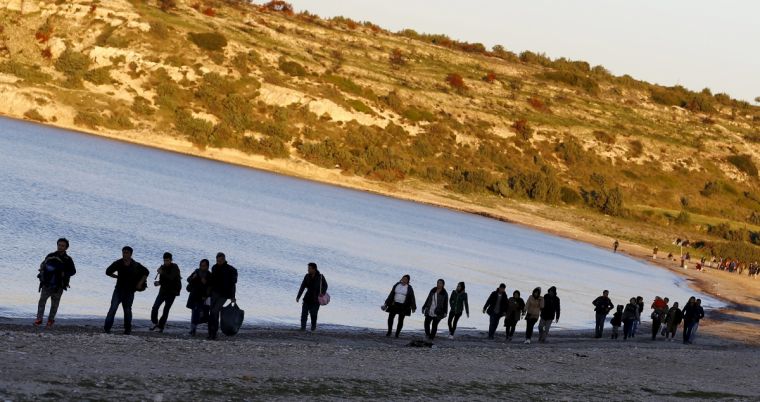Turkey: EU in talks to end flow of migrants to Greece

The European Union hopes a summit with Turkey on Monday can start putting an end to the chaotic arrivals of migrants in Greece and halt their treks through the Balkans toward Germany, diplomats said on Sunday.
The meeting in Brussels will set out a tougher position on taking in migrants who reach Greece and formalise the closing of borders against those heading north from there. The EU leaders are also likely to tell Turkish Prime Minister Ahmet Davutoglu of their concern about human rights after the Turkish government seized control of a critical newspaper over the weekend.
EU leaders will also reassure Greek Prime Minister Alexis Tsipras of help housing thousands now stranded in Greece who hoped to follow the million that found refuge in Germany last year, diplomats said after a meeting of EU envoys on Sunday before the summit.
An EU endorsement of recent border closures by Macedonia, Austria and other countries on the route north from Greece will be accompanied by a renewed commitment to revive stalled plans to redistribute asylum claimants around the 28 EU nations.
A draft EU agreement will declare that the "West Balkan route is closed", diplomats said, although they added the statement was likely to go through considerable redrafting.
NATO said a new naval force in the Aegean secured approval for operating in Turkish and Greek waters. That will lend force to a new agreement by Turkey to take back migrants halted in its waters and those who reach Greek islands but fail to qualify for asylum in Europe.
Meeting Davutoglu two days after his government seized control of Zaman, Turkey's top-selling newspaper, EU leaders are torn between anger at Ankara's action and fear of derailing Turkish willingness to stop migrants sailing for Greece.
European Council President Donald Tusk, the former Polish premier who will chair Monday's talks with Davutoglu, had barely left a meeting with President Tayyip Erdogan on Friday and declared cautious optimism on the migrant crisis when Istanbul police seized the newspaper.
"It's a slap in the face," one senior EU official told Reuters after EU envoys met in Brussels on Sunday. "Erdogan wants obviously to show that he can do what he wants."
Diplomats close to that preparatory meeting said EU leaders will raise the issue with Davutoglu. But some fear that desire to see Turkey restrain departing migrants and take back those who make it to Greece will mute European support for Erdogan's opponents.
Risking all on Turkey
The leader of the liberal group in the European Parliament, former Belgian premier Guy Verhofstadt, called the takeover of Zaman an "offense" to EU leaders who, he said, were being "naive" in risking all "on a single card – Turkey".
That criticism was echoed by Amnesty International's deputy director for Europe, Gauri van Gulik. "Using Turkey as a 'safe third country' is absurd," she said. " ... Europe has an absolute duty to protect refugees and must make the bold decision to fast-track significant, unconditional resettlement as a matter of urgency."
However, German Chancellor Angela Merkel, who faces regional elections next Sunday that will pass judgment on her decision to take in asylum seekers last year, is keen to see a three-month old deal with Ankara start working. She was meeting Davutoglu in Brussels late on Sunday.
Germany has been pushing for resettlement of thousands of Syrian refugees from the more than two million in Turkey, as well as large numbers from Jordan and Lebanon. But diplomats say that is unlikely to be discussed in detail until the EU sees flows from Turkey are falling.
Over a weekend that saw at least another 18 people drown in the straits between Turkey and Greece, Turkish gendarmes mounted a raid on a beach opposite Lesbos. Reuters journalists saw them stop some 120 migrants from leaving and arrest at least two from a migrant-smuggling gang.
However, some 30,000 migrants are bottled up in Greece and 2,000 to 3,000 more arrive daily. Tsipras, struggling with an economy blighted by the euro zone debt crisis, has called for urgent help and insisted Greece will not become a "warehouse of souls".
Diplomats and EU officials said they believe that clear signs Europe's external borders are being brought under control can ease resistance from some in the EU to a plan to relocate asylum seekers from Greece to other European countries – a scheme that has seen barely 300 people move from Greece over the past few months.
Three months ago, EU leaders, fearful that border closures have put their Schengen passport-free zone in jeopardy, agreed to provide 3 billion euros ($3.3 billion) to help care for Syrian refugees in Turkey. They also promised to revive talks on Ankara's EU membership and speed up a plan to give Turkish travellers easier visa access to the European Union.











